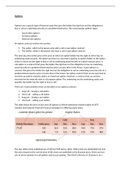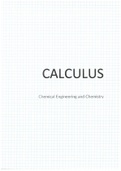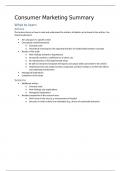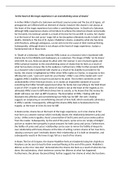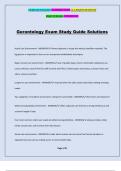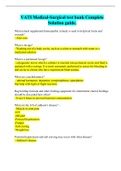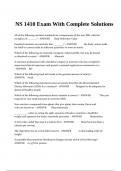Options
Options are a special type of financial asset that give the holder the right but not the obligation to
buy or sell an underlying security at a predetermined price. The most popular options types:
- Stock index options
- Currency options
- Interest rate options
An option contract involves two parties:
1. The writer, which is the person who sells a call or put option contract
2. The holder, which is the person who buys a call or put option contract
The exercise price/strike price is the price at which an option holder has the right to sell or buy an
underlying asset/security. The option premium is a fee that is paid by an option holder to the option
writer in return for the right to buy or sell an underlying asset/security at a given exercise price. A
call option is a contract that gives the holder the right but not the obligation to buy an underlying
asset/security at a predetermined exercise price at some time in the future. A put option is a
contract that gives the holder the right but not the obligation to sell an underlying asset/security at a
predetermined exercise price at some time in the future. An option contract that can be exercised at
any time up until its maturity date is an American option. However, a contract that can only be
exercised on the maturity date is a European option. The underlying are the underlying assets and
quantity the holder has the right to buy or sell.
There are 4 basic positions that can be taken on an options contract:
1. long call – buying a call option
2. short call – selling a call option
3. long put – buying a put option
4. short put – selling a put option
The table shows the price of put and call options on British petroleum shared traded at LIFFE
(London International Financial Futures Exchange) for differing expiry dates.
The two strike prices published are at 520 and 540 pence; other strike prices are obtainable but only
the ones closest to the current price of the share are published in the financial press. There are two
sets of prices quoted, for call options and for put options. The March call price of 18 pence is at a
, strike price of 540 pence. The price paid for the call option of 18 pence is known as the option
premium, and the buyer of such a call option would have the right but not the obligation to buy
1,000 British Petroleum shares at a price of 540 pence in March for a cost of 18 pence per share
(that is, a total cost of £180). Alternatively, an investor could, for 38 pence per share, have the right
but not the obligation to sell 1,000 (that is, a total cost of £380) British Petroleum shares at a price of
540 pence in March.
A call option contract:
Consider the underlying asset as 1,000 shares in British Petroleum which are currently priced at 525
pence. Mr A buys a call option with a strike price of 540 for March 2010 for an option premium of 18
pence a share (a total of £180 i.e. £0.18 x 1000). Mr A has purchased the right to buy from the writer
of the option 1,000 shares in British Petroleum’s at a price of 540 per share. The maximum amount
that the option holder can lose is £180, while the maximum profit the option writer can make is
£180.
The Table below shows the profit and loss profile per share for the March call option for different
possible spot prices of British Petroleum shares in March 2010.
If the price in March is below 540 pence, the holder will not exercise the option as the shares can be
bought more cheaply on the spot market and the option holder will have lost the £180 premium
paid, with the writer making £180. If the price of the shares at the expiration date in March is above
540, then the holder will exercise the option, since it will pay him to buy the shares at 540 pence and
sell them spot at a higher price. If the price rises above 540 pence but to less than 558 pence, it pays
the holder to exercise the option; however, since he has paid 18 pence for the option he will make
an overall loss. For example, if the price has risen to 550 pence he will exercise the right to buy the
shares at 540 pence and sell them spot at 550 pence making 10 pence per share; but taking into
account the 18 pence option premium paid he will make a loss of 8 pence per share or £80 in total. A
Options are a special type of financial asset that give the holder the right but not the obligation to
buy or sell an underlying security at a predetermined price. The most popular options types:
- Stock index options
- Currency options
- Interest rate options
An option contract involves two parties:
1. The writer, which is the person who sells a call or put option contract
2. The holder, which is the person who buys a call or put option contract
The exercise price/strike price is the price at which an option holder has the right to sell or buy an
underlying asset/security. The option premium is a fee that is paid by an option holder to the option
writer in return for the right to buy or sell an underlying asset/security at a given exercise price. A
call option is a contract that gives the holder the right but not the obligation to buy an underlying
asset/security at a predetermined exercise price at some time in the future. A put option is a
contract that gives the holder the right but not the obligation to sell an underlying asset/security at a
predetermined exercise price at some time in the future. An option contract that can be exercised at
any time up until its maturity date is an American option. However, a contract that can only be
exercised on the maturity date is a European option. The underlying are the underlying assets and
quantity the holder has the right to buy or sell.
There are 4 basic positions that can be taken on an options contract:
1. long call – buying a call option
2. short call – selling a call option
3. long put – buying a put option
4. short put – selling a put option
The table shows the price of put and call options on British petroleum shared traded at LIFFE
(London International Financial Futures Exchange) for differing expiry dates.
The two strike prices published are at 520 and 540 pence; other strike prices are obtainable but only
the ones closest to the current price of the share are published in the financial press. There are two
sets of prices quoted, for call options and for put options. The March call price of 18 pence is at a
, strike price of 540 pence. The price paid for the call option of 18 pence is known as the option
premium, and the buyer of such a call option would have the right but not the obligation to buy
1,000 British Petroleum shares at a price of 540 pence in March for a cost of 18 pence per share
(that is, a total cost of £180). Alternatively, an investor could, for 38 pence per share, have the right
but not the obligation to sell 1,000 (that is, a total cost of £380) British Petroleum shares at a price of
540 pence in March.
A call option contract:
Consider the underlying asset as 1,000 shares in British Petroleum which are currently priced at 525
pence. Mr A buys a call option with a strike price of 540 for March 2010 for an option premium of 18
pence a share (a total of £180 i.e. £0.18 x 1000). Mr A has purchased the right to buy from the writer
of the option 1,000 shares in British Petroleum’s at a price of 540 per share. The maximum amount
that the option holder can lose is £180, while the maximum profit the option writer can make is
£180.
The Table below shows the profit and loss profile per share for the March call option for different
possible spot prices of British Petroleum shares in March 2010.
If the price in March is below 540 pence, the holder will not exercise the option as the shares can be
bought more cheaply on the spot market and the option holder will have lost the £180 premium
paid, with the writer making £180. If the price of the shares at the expiration date in March is above
540, then the holder will exercise the option, since it will pay him to buy the shares at 540 pence and
sell them spot at a higher price. If the price rises above 540 pence but to less than 558 pence, it pays
the holder to exercise the option; however, since he has paid 18 pence for the option he will make
an overall loss. For example, if the price has risen to 550 pence he will exercise the right to buy the
shares at 540 pence and sell them spot at 550 pence making 10 pence per share; but taking into
account the 18 pence option premium paid he will make a loss of 8 pence per share or £80 in total. A

